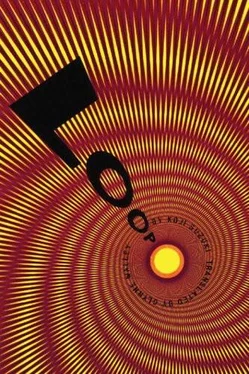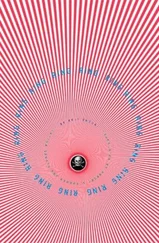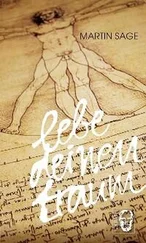"Stop making me repeat myself." Few things annoyed the impatient Hideyuki more.
"Sorry."
"What gave you the idea, in other words?"
Kaoru explained how a TV special on longevity villages had been playing in the background while on the computer he'd been looking at a map of gravitational anomalies, and how he'd had a flash of intuition.
"I think it was just a coincidence."
"Meaningless coincidences produce nothing. Take jinxes, for instance."
"Jinxes?"
Kaoru actually had something of an idea why his father would bring up something unscientific like that now. He was trying to give Machiko an entry into the conversation.
Having pretty much finished fixing snacks to go with the beer, Machiko had joined them at the dining room table, where she sat listening to the conversation without offering up a word. Not that she'd looked particularly bored, but she did lean forward just a bit when her husband mentioned jinxes.
Her reaction didn't escape Hideyuki's notice.
"Hey, Machi. Know of any interesting jinxes?"
"Why ask me?"
"You like that kind of thing, don't you? Fortune-telling, charms, stuff like that. Don't think I haven't noticed you reading the horoscopes every week. Plus, you know a lot about folk-tales from around the world."
"Okay, jinxes. How about the one that says if you give a handkerchief to your lover as a present you'll break up?"
"Everybody knows that one. Don't you know anything, you know, weirder?"
Kaoru thought he could guess what kind of thing his father was looking for. He was probably trying to find an example of a belief that connected, seemingly at random, two disparate phenomena.
"Something weirder? Okay, how about this? If you see a black cat swimming in a river, someone close to you will die."
Kaoru immediately pursed his lips. "Really?"
"That's what they say. You've heard it, haven't you, dear?" She looked at Hideyuki for support. But he just laughed and cocked his head.
"Don't you have any that are just way out there?"
"How about the one that says, when you leave the house, if a chair has its back to the window, you'll drop your wallet?"
Hideyuki clapped his hands.
"Okay, we'll go with that one. Now, it may be true or it may be false, but let's just take it as a given that such a superstition exists."
"It does!" Machiko frowned.
"Alright, alright!" Hideyuki said, putting his palms together. "Now, we have two phenomena brought together. A chair having its back to the window when you leave the house, and dropping your wallet. Scientifically, these two phenomena have no relation to each other. There are lots of superstitions in the world, and no doubt different kinds come about for different reasons. But what I find fascinating is when you have the exact same superstition existing in two distant places, isolated from each other. If this crazy superstition that Machi just told us about happened to exist in different places on the globe, it'd make you wonder, wouldn't it? Of course it would."
"So, are there superstitions like that? That exist in different places in the world?" Kaoru looked back and forth between Machiko and Hideyuki.
Hideyuki prompted his wife. "How about it, Machi?"
"Of course there are. The jinx I just told you about is one. It exists in Europe and in the Americas, too."
Kaoru and Hideyuki exchanged sceptical looks.
"By the way, Machi, have you ever thought about why superstitions arise?"
"No," she said, curtly.
"What about you, kiddo?"
"I guess it has something to do with human psychology. I'm not real sure, though."
By this point there were five empty beer bottles sitting in front of Hideyuki. His conversational engine was finally getting warmed up.
"Ask yourself: what is a superstition? It's an oral tradition that if you see something or experience something, a certain thing will happen. With a jinx it's something bad, but of course a superstition can involve something good, or even something that can't necessarily be categorized as good or bad. To cut to the chase, a superstition is something that connects one phenomenon with another phenomenon. Sometimes science can explain the connection. For example, the superstition that when clouds move from east to west it means it'll rain can be explained very easily by modern meteorology. There are others that you can understand intuitively, like the one that says being photographed takes years off your life. Or ones about breaking chopsticks or sandal thongs, or seeing black cats or snakes, those aren't too hard to understand. Those things are just eerie somehow. There's something about black cats and snakes that makes people the world over uneasy.
"The problem is superstitions that aren't reasonable. The ones that strike you as totally arbitrary, like, 'Why in the world do people believe that?' The jinx Machi told us about is a good example. What could having a chair back toward the window when you leave the house possibly have to do with dropping your wallet?"
Hideyuki stopped and looked Kaoru in the eye.
"Maybe it's based on experience."
"No doubt it is. Maybe people found out through experience that the chances of dropping your wallet are greater if a chair's back is to the window when you leave your house."
"But there's no statistical necessity that it has to be that way."
"We're not talking strict accuracy here. Let's say when you drop your wallet, it just so happens that the chair's back is to the window. And let's say that the next time you drop your wallet, the chair's back is toward the window again. So you tell someone about it, suggesting that the two phenomena are related somehow. Now the important thing is whether or not the person you tell about it has had a similar experience-whether or not they can nod and say, 'yeah, you're right'. If the idea is dismissed by a third party, then chances are it won't be handed down. But once it becomes established as a jinx, then by the mere fact of people's being aware of it, it can influence their actions, and so it stands a good chance of surviving. Once the relationship is established between the two things, the fact that people are aware of the relationship strengthens the bond even more, see. Reality and imagination begin to correspond to one another."
"So you're saying that the phenomenon of a chair having its back to the window when you leave the room and the phenomenon of dropping your wallet exert some kind of invisible influence on each other?"
"You can't rule out the possibility that they're connected on some level, deep down."
What was his father trying to say, using the superstition as an example? Kaoru had the feeling that he could substitute "life" for "superstition" and the argument would still stand up.
"Life," Kaoru muttered. As if that word were a cue, the three exchanged glances.
"It reminds me of the Loop."
It was Machiko who brought up the subject. It seemed she felt it was a natural progression from the word "life".
Hideyuki had started his college career in pre-med. He'd switched fields, to logic, in graduate school, studying the concepts of meta-mathematics, but one thing led to another and he found his old abandoned interest in the world of living things rekindled. He decided it would be interesting to see if the language of mathematics could explain life. His original interest in biology was reanimated as it found expression in numbers.
Thus it was that when he'd finished his doctorate and received an offer to join a joint Japanese-American research project on artificial life, he'd accepted without a second thought. To create life within a computer? Hideyuki couldn't think of anything he wanted to do more.
He was still young, in his late twenties, married but childless. Five years after he took the appointment, the project was brought to a halt in an entirely unforeseen way. It wasn't a failure, having achieved a certain manner of success. But it never felt like success to Hideyuki because the way it all ended stuck in his throat.
Читать дальше
Конец ознакомительного отрывка
Купить книгу






![Yuriy Ktitorov - Sasha [Love]. Part 1](/books/459553/yuriy-ktitorov-sasha-love-part-1-thumb.webp)





